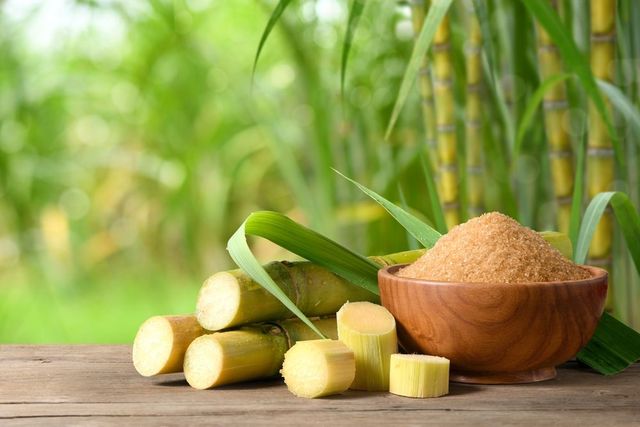Why Cane Sugar Processing Chemicals Are Important for Modern Sugar Refining
The function of cane sugar handling chemicals in modern-day sugar refining can not be overstated, as they are important to boosting both the effectiveness of extraction and the total quality of the last product. Representatives such as phosphoric acid and certain flocculants are utilized to remove impurities, leading to sugar that not just fulfills consumer assumptions yet additionally complies with sector standards. The effects of these chemicals prolong beyond quality, touching upon market characteristics and ecological considerations. sugar and cane. This increases crucial questions concerning the sustainability of such practices and their effect on the future of sugar production.
Role of Processing Chemicals
The efficacy of walking cane sugar processing hinges considerably on the strategic application of handling chemicals. These chemicals play a pivotal duty in boosting the efficiency and quality of sugar removal and refining. From the preliminary stages of juice extraction to the final purification actions, processing chemicals help with numerous critical operations.
In the extraction phase, chemicals such as phosphoric acid and calcium hydroxide are employed to maximize the information procedure, aiding to eliminate pollutants and suspended solids from the walking cane juice. This not only improves the return however also ensures the quality of the end product. Additionally, representatives like flocculants aid in the rapid settling of contaminations, consequently improving the overall process.
Triggered carbon and ion exchange materials serve to get rid of color and smell, guaranteeing that the polished sugar fulfills consumer top quality requirements. Hence, the precise choice and application of these chemicals are essential for accomplishing optimal results in walking stick sugar handling.
Key Kinds Of Chemicals
Walking stick sugar handling counts on a variety of key chemicals that help with each phase of manufacturing. These chemicals play essential roles in clarifying, lightening, and detoxifying the sugar removed from cane.
One primary group of chemicals consists of flocculants, such as polyacrylamide, which aid in the information procedure by advertising the gathering and settling of contaminations. In addition, calcium hydroxide is frequently utilized to reduce the effects of acidity and assist in the removal of non-sugar components.
Bleaching agents, such as turned on carbon and sulfur dioxide, are made use of to decolorize the syrup, causing a more clear end product. These chemicals help remove shade substances that may affect the sugar's look and bankability.
In addition, phosphoric acid acts as a pH regulator throughout the handling phases, making sure optimal conditions for the enzymatic tasks associated with sugar removal and purification.
Other important representatives include edta (ethylenediaminetetraacetic acid), which chelates steel ions that might catalyze unwanted reactions, and sodium hydroxide, which assists in pH control throughout the refining procedure. Collectively, these chemicals enhance performance and ensure a top notch walking stick sugar item.
Benefits for Sugar Top Quality
Frequently overlooked, the usage of particular handling chemicals substantially enhances the overall quality of walking cane sugar. These chemicals play a pivotal duty in refining processes, ensuring that the last item satisfies strict industry requirements for pureness and taste.

Additionally, processing chemicals help in achieving a consistent granulation and texture, which are essential for customer approval. By managing the condensation process, these chemicals guarantee that the sugar crystals develop consistently, resulting in an extra enticing item that useful reference dissolves well in numerous applications.
In addition, the use of these chemicals can enhance the shelf life of cane sugar by minimizing dampness absorption and microbial development. Overall, the critical application of handling chemicals is important for providing top quality walking cane sugar that satisfies consumer assumptions and sector demands.
Environmental Impact Factors To Consider

Furthermore, the energy-intensive nature of sugar refining, compounded by chemical usage, typically causes boosted carbon exhausts. This adds to environment modification and elevates problems regarding the sustainability of current refining practices. Furthermore, the sourcing of these chemicals might entail techniques that intimidate biodiversity, such as monoculture farming, which lowers the strength of farming ecosystems.

To alleviate these influences, her explanation sugar refiners are increasingly checking out sustainable alternatives and taking on ideal methods that lessen chemical usage. Carrying out extensive environmental monitoring systems can aid make sure that the refining process lines up with environmental criteria and promotes biodiversity. Ultimately, a well balanced strategy that focuses on both sugar quality and ecological stewardship is crucial for the long-lasting practicality of the sugar industry.
Future Fads in Refining
As the sugar market grapples with the ecological difficulties associated with conventional refining approaches, ingenious approaches are arising to enhance both performance and sustainability. One substantial trend is the fostering of green chemistry concepts, which prioritize making use of safe, biodegradable handling chemicals. This shift not just minimizes ecological effect yet likewise addresses customer demand for cleaner manufacturing methods.
An additional promising advancement is the implementation of sophisticated filtration modern technologies, such as membrane splitting up and adsorption procedures. These techniques enhance the clarity and top quality of the sugar while decreasing the quantity of wastewater generated during refining. Additionally, the integration of digital modern technologies, including IoT and AI, is transforming functional performance by allowing real-time monitoring and predictive maintenance, hence minimizing resource waste.
Moreover, using spin-offs from sugar refining, such as bagasse and molasses, is obtaining grip. These products can be converted right into biofuels or value-added informative post items, adding to a round economy within the market. Collectively, these trends indicate a change towards more sustainable methods that not only improve functional performance yet additionally align with global sustainability goals, making sure the future stability of sugar refining.
Verdict
Cane sugar processing chemicals are necessary in modern-day sugar refining, dramatically boosting the effectiveness and top quality of sugar removal. The strategic use of these chemicals not just boosts the purity and taste of the end product but also ensures constant condensation and structure. As the market progressively prioritizes sustainability, the fostering of environmentally-friendly processing agents is likely to form future fads in refining, inevitably causing better items and expanded rack life for customers.

Inevitably, a balanced method that prioritizes both sugar top quality and environmental stewardship is vital for the lasting viability of the sugar industry.
Cane sugar handling chemicals are essential in modern sugar refining, substantially boosting the performance and top quality of sugar extraction.